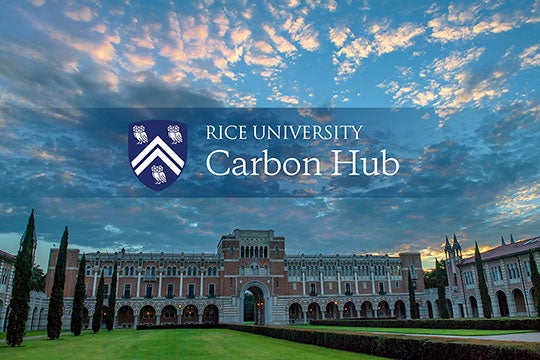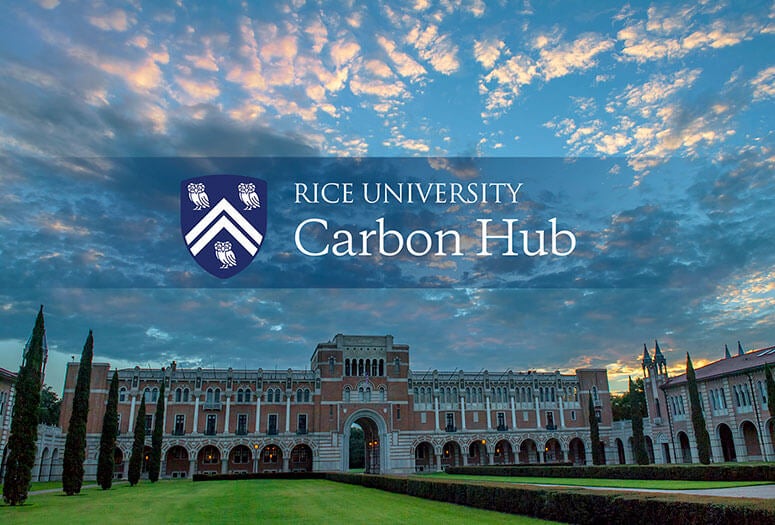HOUSTON – (March 21, 2022) – The Saudi Arabian Oil Co. (Aramco) has joined Carbon Hub, a research initiative led by Rice University to accelerate the energy transition by developing sustainable uses of hydrocarbons.
Launched in 2019, Carbon Hub supports a zero-emissions future where clean hydrogen energy and advanced carbon materials are coproduced efficiently and sustainably from hydrocarbons. Aramco has joined Carbon Hub with a $10 million, five-year sponsorship commitment.

“We’re excited to welcome the Aramco group to the Carbon Hub,” said Rice’s Matteo Pasquali, a chemical engineer, chemist and materials scientist who directs Carbon Hub. “With strong participation and representation from Aramco and SABIC, they are great partners because they span multiple steps in the carbon value chain, from feedstock production to material manufacturing.”
Carbon Hub provides funding and direction to basic science, engineering and policy research. The goal is to accelerate the development and deployment of large-scale technologies that coproduce clean hydrogen fuel and carbon materials from hydrocarbons. These products are used sustainably in construction, mobility, textile and food industries. Carbon Hub’s technologies produce no carbon dioxide and provide a path to simultaneously decarbonize the industrial sector, preserve and expand manufacturing jobs and promote economic growth.
Carbon Hub’s focus aligns with Aramco’s corporate initiatives on hydrogen and nonmetallic materials. With its SABIC partner, Aramco and other Carbon Hub members plan to develop carbon materials to potentially displace emissions-intensive materials across broad industry sectors. Examples include steel and other metals, concrete and soil enhancers. For instance, innovative carbon conductors could address market needs for increased electrification and alleviate emissions and environmental impacts associated with mining copper and aluminum.
“We are excited about joining Carbon Hub. With this collaboration, there is a great potential in the coproduction of hydrogen and carbon-based materials from hydrocarbons, with the aim to significantly reduce the carbon intensity of energy systems and infrastructures worldwide,” said Ahmad Al Khowaiter, Aramco’s chief technology officer.
Carbon Hub’s research network includes more than 100 scientists at 20 leading organizations. Its operating model allows nonprofit, corporate and government members to collaborate in an open environment. Carbon Hub’s model also allows corporations to access the intellectual property from research breakthroughs and accelerate the parallel development of multiple technologies.
- Image download
-
https://news-network.rice.edu/news/files/2019/12/1209_HUB-rice-lg.jpg
CUTLINE: Carbon Hub is a climate change research initiative based at Rice University. (Photo by Tommy LaVergne/Rice University) - About Rice
-
Located on a 300-acre forested campus in Houston, Rice University is consistently ranked among the nation’s top 20 universities by U.S. News & World Report. Rice has highly respected schools of Architecture, Business, Continuing Studies, Engineering, Humanities, Music, Natural Sciences and Social Sciences and is home to the Baker Institute for Public Policy. With 4,052 undergraduates and 3,484 graduate students, Rice’s undergraduate student-to-faculty ratio is just under 6-to-1. Its residential college system builds close-knit communities and lifelong friendships, just one reason why Rice is ranked No. 1 for lots of race/class interaction and No. 1 for quality of life by the Princeton Review. Rice is also rated as a best value among private universities by Kiplinger’s Personal Finance.

